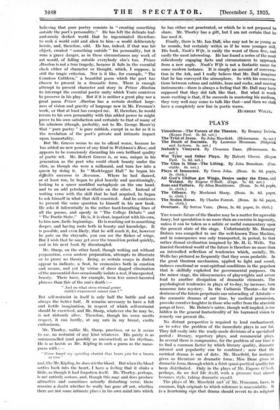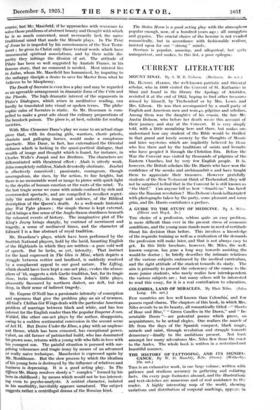PLAYS
Timotheus—The Future of the Theatre. By Bonamy Dobree. (Kogan Paul. 2s. 6d. net.) All God's Chillun got Wings, Desire -under the:Elms, and
5s. cloth.)
THE remote future of the theatre may be a matter for agreeable fancy, but speculation is no more than an exercise in ingenuity, unless it can be taken as a satiric or useful commentary upon the present state of the stage. Unfortunately Mr. Bonamy Dobree was compelled to use the well-known Time Machine, and in consequence was only transported, in period, to that rather dismal civilization imagined by Mr. H. G. Wells. The fancied theatrical world of the future is therefore no more than an intensified reflection of tendencies 'which, socially, Mr. Wells has pictured so frequently that they seem probable. In the great theatres mechanism, applied to light and sound, induces emotional or semi-spiritual conditions in the populace that is skilfully exploited for governmental purposes. On the minor stage, the idiosyncrasies of playwrights and actors lead to another dissipation of -dramatic elements. The psychological tendencies in plays of to-day, by increase, turn nonsense 'into mystery. In the Catharsis Theatre—for the denizens-of the future perpetuate our misreading of Aristotle— the romantic dramas of our time, by medical permission, provoke curative laughter in those who suffer from the atavistic pangs of love. Mr. Dobree's satire, though well' implied, is too hidden in the general fantasticality of his borrowed vision to remedy our present ills.
- No distant perspective is required to lend enchantment, or to solve the problem of the immediate plays in our list.
They fall easily into the ready-made divisions of a specialized
period : literary, repertory plays, and commercial plays. In several there is compromise, .fOr the problem of our time is to find a common factor by which literary quality, dramatic
interest and popularity can be combined ; now that the metrical drama is out of date. Mr. Masefield, for instance,
gives us literature in drainatic form ; Miss Dane gives US dramatic form, through which a faint quasi-poetical quality has been distributed.- Only in the plays. of Mr. Eugene- O'Neill, perhaps, do we ieel- life itself, with a Pressure that almost becomes style, taking dramatic Mould. - The plays of ill.. Masefield and' Of -Mr. Housman, have, in common, -high originals to which reference is unavoidable. It is a heartening sign that drama should revert to its religious source; but Mr: Maiefield; if he approaches with HiVerenee to solve those problems of abstract beauty and thought with which he is so much concerned, must necessarily lack the naive traditional mind that made the Miracle plays. In The Trial of Jesus he is impeded by his consciousness of the New Testa- ment ; he gives to Christ only those textual words which have immemorial spiritual associations, and by their noble dis- parity they infringe the illusion of art. The attitude of pilate has been so well suggested by Anatole France, in his famous story, that no comment is needed. Most interest lies in Judas, whom Mr. Masefield has humanized, by imputing to the unhappy disciple a desire to save his Master from what he believes to be blaiphemy.
The Death of Socrates is even less a play and may be regarded as an agreeable arrangement in dramatic form of the Crito and the Phaedo. The high dramatic interest of the arguments in Plato's Dialogues, which arises in meditative reading, can hardly be translated into visual or spoken terms. The philo- sophic calm of Socrates is static. So Mr. Housman is com- pelled to make a great ado about the culinary preparations of the hemlock poison. The piece is, at best, suitable for reading societies.
With Miss Clemence Dane's play we come to an actual stage piece that, with its dancing girls, warriors, choric priests, chariots and galloping horses, would make a sumptuous spectacle. Miss Dane, in fact, has externalized the Oriental richness which is lacking in the quasi-poetical dialogue, that wealth of image and thought which is found, for instance,. in Charles Wells's Joseph and his Brethren. The characters are differentiated with theatrical effect : Ahab is utterly weak, Jehu completely ruthless, Nabob devotedly obstinate. Jezebel is effectively conceived ; passionate, courageons, though unscrupulous, she rises, by the action, to fine heights, but there is no memorable word or image to pierce with quick light to the depths of human emotion or the roots of the mind.- To the last tragic scene we come with minds confused by rich and overcrowded spectacle, and are compelled to recollect regret- fully 'the austerity,' in image 'and cadence; of the Biblical deicription of the Queen's death. As a well-made historical play Wat Tyler pleases ; the simple theme is kept external, but it brings a fine sense of the Anglo-Saxon sturdiness beneath the coloured events of history. The imaginative plot of The King's Jewry brings sharply, by contrast of merriment and tragedy, a sense of mediaeval- times, and the character of Edward I is a fine abstract of royal tradition.
Mr. Brandane's plays, which have been performed by the Scottish National players, hold by the lucid, haunting English of the Highlands in which they are written—a pure cold well of speech. But he lacks, as yet, intensity: That instinct for the land expressed in The Glen is Mine, which depicts a struggle between cottier 'and landlord, is suddenly resolved by a complacent appeal to our good nature. The Lifting, which should have been kept a one-act play, evokes the atmos- phere of '45, suggests a rich Gaelic tradition, "but, for its tragic close, lacks culmination. Miss Gwen John's little plays, pleasantly flavoured by northern dialect, arc deft, but not deep, in their sense of indirect tragedy.- ' Mr. Eugene O'Neill has a passionate intensity of conception and eagerness that give the problem play an air of newness. Alf God's Chillun Got Wings deals with the particular American problem of marriage between black and white, and has less interest for the English reader than the popular Emperor Jnnes. Welded, like other one-act plays by the author, disappoints, owing to a sudden sentimental concession in the second scene of Act II. But Desire Under the Elms, a play with an unpleas- ant theme, which has been censored, has exceptional power. Cabot, an old farmer of patriarchal build, who has dominated' his grown sons, returns with a young wife who falls in love with his youngest son. The painful situation is pursued with sur- prising vehemence and tragic irony by means of an advanced or really naive technique. Manchester is expressed again by Mr. Monkhouse. But the slow process by which the idealism of his young hero is destroyed by the influence of relatives and business is depressing. It is a good acting play. In The Offence Mr. Sharp resolves slowly a " complex " formed by his hero in-childhood ; by means which would not be too interest- ing even to psycho-analysts. A central character, isolated in his morbidity, inevitably appears unnatural. The subject suggests rather a centrifugal drama of the Russian kind. _ The Stolen Horse is a good acting play with the atmosphere popular enough, now, of a hundred years ago ; all smugglers and gypsies. , The crucial choice of the heroine is not evaded romantically, but in accordance with fashionable realism, insisted upon for our " strong " minds.
Overture is popular, amusing, and allegorical, - but (pate unimportant, and makes, to this list, a poor epilogue.



































































 Previous page
Previous page